7-Day High-Protein Mediterranean Diet Meal Plan for Fall, Created by a Dietitian
Get ready to enjoy the flavors of the season in a way that aligns with your goals.
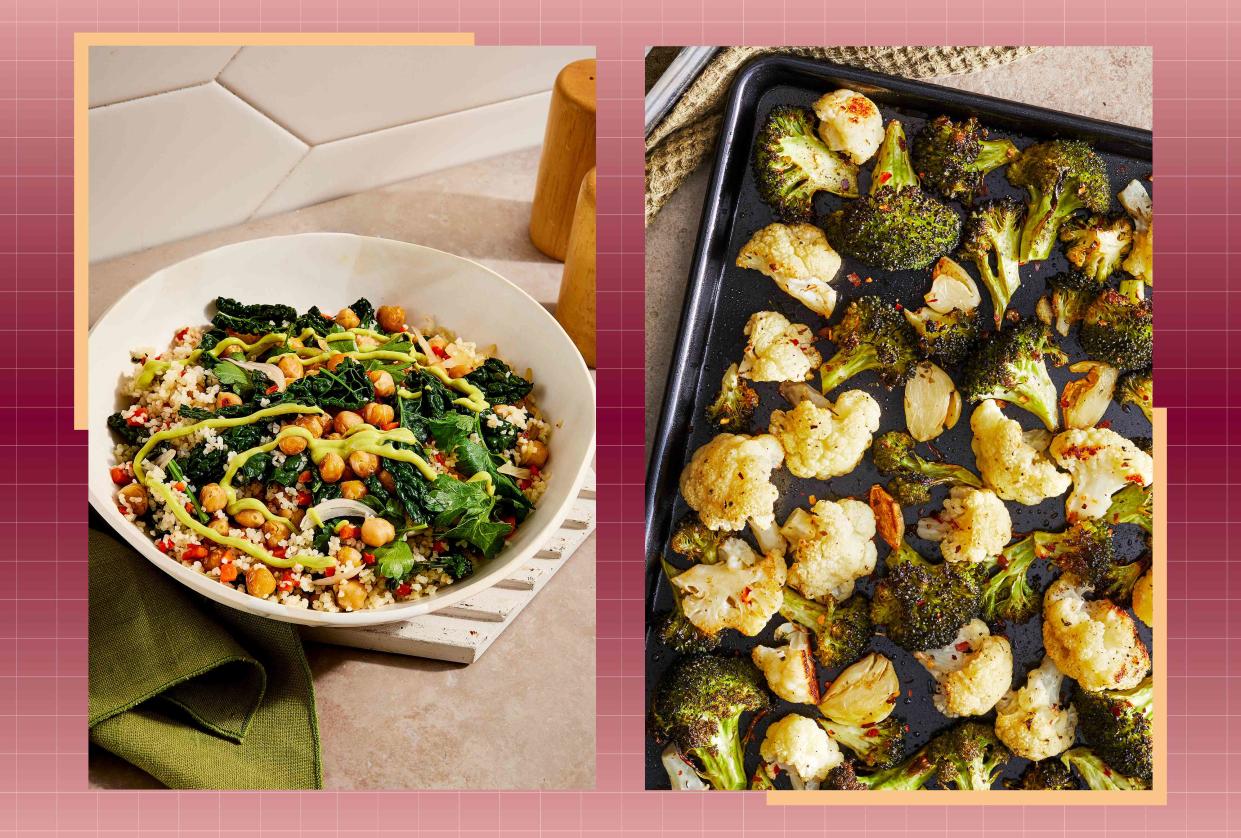
Jen Causey; Caitlin Bensel
Reviewed by Dietitian Jessica Ball, M.S., RDReviewed by Dietitian Jessica Ball, M.S., RD
Fall is almost here! Enjoy comforting fall soups and cozy dinners with this high-protein seven-day meal plan. With at least 80 grams of protein every day, this weekly meal plan will keep you full and satisfied while helping you reach your health goals like supporting muscle growth, digestive health and healthy weight maintenance. Plus, these meals can also help you follow the Mediterranean diet, named one of the healthiest eating patterns for seven years in a row.
How We Create Meal Plans
Registered dietitians thoughtfully create EatingWell’s meal plans to be easy-to-follow and delicious. Each meal plan meets specific parameters depending on the health condition and/or lifestyle goal it is targeting and is analyzed for accuracy using the nutrition database, ESHA Food Processor. As nutritional needs differ from person to person, we encourage you to use these plans as inspiration and adjust as you see fit.
Why This Plan Is Great for You
Protein is an important macronutrient that keeps you strong and healthy. It’s made up of building blocks called amino acids, which are found in every cell in the body. Getting enough protein is important for maintaining healthy muscles, bones, skin, hair and more. From supporting your immune system to repairing or growing tissues, protein plays a key part in many crucial body functions.
We set this plan to include at least 80 grams of protein per day, a level at which most people will meet their needs. However, daily protein needs vary based on a variety of individual factors, including age, activity level and more. Feel free to adjust this plan to best meet your needs.
This 1,800-calorie meal plan has modifications for 1,500 and 2,000 calories to support those with different calorie needs. While we previously included meal plans and modifications for 1,200 calories, we no longer do. The 2020-2025 Dietary Guidelines for Americans suggests that limiting your calories to 1,200 per day is too low for most people to meet their nutritional needs, plus it’s unsustainable for long-term health and well-being.
Frequently Asked Questions
Is it OK to mix and match meals if there is one I do not like?
Yes! This meal plan is meant to serve as a framework for a healthy high-protein eating plan. It doesn’t need to be followed exactly to reap the benefits. When choosing recipes, we made sure to check calories, protein and sodium so they would fit within the total calorie goal of 1,800 calories per day, be within our sodium limits, and be high in protein. If you’re making a recipe swap, it may be helpful to choose a recipe with similar calories, protein and sodium levels. For more inspiration, check out these 23 High-Protein Mediterranean Diet Meals You Can Make in 20 Minutes.
Can I eat the same breakfast or lunch every day?
Definitely, it’s fine to eat the same breakfast or lunch every day. The breakfasts range from 295 to 350 calories, while the lunches span 344 to 419 calories. These ranges are fairly close, though if you’re closely monitoring your calories or other nutrients, like protein, you may want to adjust a snack or two.
Why is there not a modification for 1,200 calories?
We no longer provide modifications for 1,200-calorie days in our meal plans. The 2020-2025 Dietary Guidelines for Americans suggests that limiting calories to 1,200 per day is too low for most people to meet their nutritional needs, plus it’s unsustainable for long-term health and well-being.
Health Benefits of a Mediterranean Diet
There are numerous positives of the Mediterranean diet. Research shows that following a Mediterranean diet can help with improving your brain health, lowering your risk for heart disease and supporting healthy weight maintenance, just to name just a few. If you're not familiar with the Mediterranean diet, it focuses on prioritizing eating whole grains, fish, nuts, unsaturated fats like olive oil, fruits and vegetables, plus dairy, poultry and meat in moderation. The great thing about it is that it doesn’t only apply to foods specifically from the Mediterranean region! You can include ingredients from all over the world to follow this eating pattern.
Mediterranean Diet Foods to Focus On
Whole grains
Beans
Lentils
Vegetables
Fruit
Unsaturated fats like olive oil, canola oil or avocado oil
Nuts
Seeds
Fish
Poultry
Eggs
Dairy
Herbs and spices
Related: Ultimate Mediterranean Diet Foods List
How to Meal-Prep Your Week of Meals
Prep Apple Pie-Inspired Overnight Oats for breakfast on Days 2 through 5.
Make Slow-Cooker Bean, Kale & Barley Soup for lunch on Days 2 through 5.
Bake some Everything-Seasoned Almonds for a snack throughout the week.
Day 1
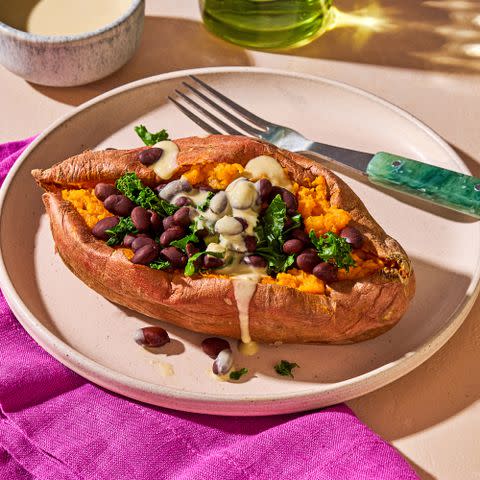
Ali Redmond
Breakfast (501 Calories)
1 serving High-Protein Black Bean Breakfast Bowl
1 medium banana
A.M. Snack (181 Calories)
½ cup plain Greek-style strained yogurt
1 medium pear
Lunch (407 Calories)
1 serving Salmon Tacos with Pineapple Salsa
⅓ avocado, sliced
P.M Snack (150 Calories)
⅓ cup hummus
4 carrot sticks
Dinner (472 Calories)
Daily Totals: 1,831 calories, 56g fat, 12g saturated fat, 85g protein, 237g carbohydrate, 59g fiber, 2,281 mg sodium
To make it 1,500 calories: Remove the avocado from breakfast and the pear from A.M. snack.
To make it 2,000 calories: Add 2 poached eggs to breakfast and add 1 tablespoon sliced almonds to A.M. snack.
Day 2
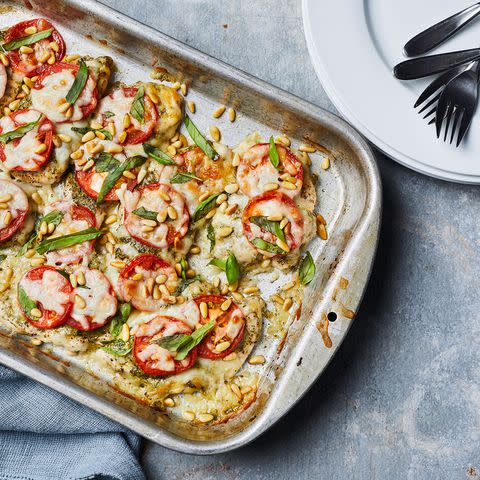
Breakfast (323 Calories)
1 serving Apple-Pie Inspired Overnight Oats
A.M. Snack (348 Calories)
1 serving Everything-Seasoned Almonds
⅓ cup cottage cheese
Lunch (373 Calories)
1 serving Slow Cooker Bean, Kale & Barley Soup
1 slice whole-wheat toast
P.M Snack (294 Calories)
Dinner (471 Calories)
1 serving Pesto Chicken Bake
1 serving Roasted Broccoli and Cauliflower
½ cup cooked whole-wheat pasta
Daily Totals: 1,809 calories, 72g fat, 14g saturated fat, 85g protein, 197g carbohydrate, 31g fiber, 2,299mg sodium
To make it 1,500 calories: Skip the Everything-Seasoned Almonds at A.M. snack.
To make it 2,000 calories: Add an extra ½ serving of soup to lunch and add 1 tablespoon natural peanut butter to P.M. snack.
Day 3
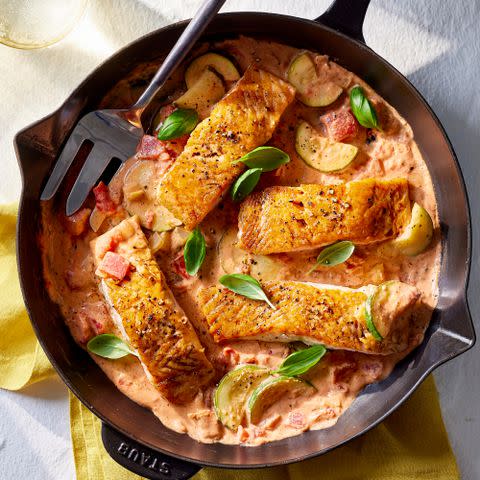
Photographer: Carson Downing, Food Stylist: Holly Dreesman, Prop Stylist: Gabriel Greco
Breakfast (323 Calories)
1 serving Apple-Pie Inspired Overnight Oats
A.M. Snack (181 Calories)
½ cup plain Greek-style strained yogurt
1 medium pear
Lunch (373 Calories)
1 serving Slow Cooker Bean, Kale & Barley Soup
1 slice whole-wheat toast
P.M Snack (391 Calories)
⅓ cup hummus
4 carrot sticks
2 oz. whole-wheat crackers
Dinner (538 Calories)
1 serving Creamy Tomato Salmon Skillet
1 serving Quick & Easy Sautéed Broccolini
½ cup cooked brown rice
Daily Totals: 1,808 calories, 51g fat, 16g saturated fat, 98g protein, 157g carbohydrate, 36g fiber, 1,921mg sodium
To make it 1,500 calories: Skip the crackers at A.M. snack.
To make it 2,000 calories: Add 1 tablespoon sliced almonds to A.M snack and have 1 medium banana for an evening snack.
Day 4
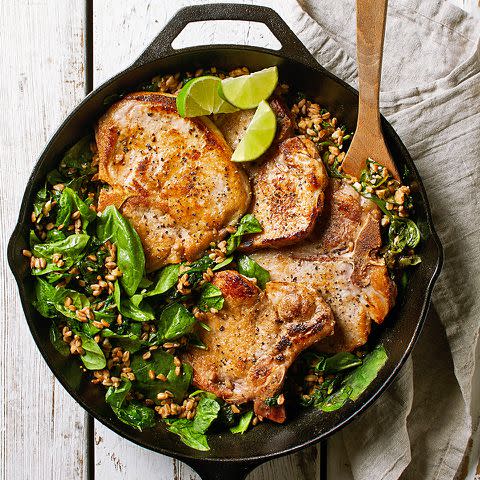
Breakfast (323 Calories)
1 serving Apple-Pie Inspired Overnight Oats
A.M Snack (294 Calories)
Lunch (373 Calories)
1 serving Slow Cooker Bean, Kale & Barley Soup
1 slice whole-wheat toast
P.M. Snack (292 Calories)
1 serving Everything-Seasoned Almonds
⅓ cup cottage cheese
Dinner (476 Calories)
1 serving Garlic-Lime Pork with Farro & Spinach
1 serving Simple Cabbage Salad
Daily Totals: 1,760 calories, 72g fat, 16g saturated fat, 90g protein, 193g carbohydrate, 27g fiber, 1,921mg sodium
To make it 1,500 calories: Skip the Everything-Seasoned Almonds at P.M. snack.
To make it 2,000 calories: Add an extra ½ serving of soup to lunch and add 1 tablespoon natural peanut butter to P.M. snack.
Day 5
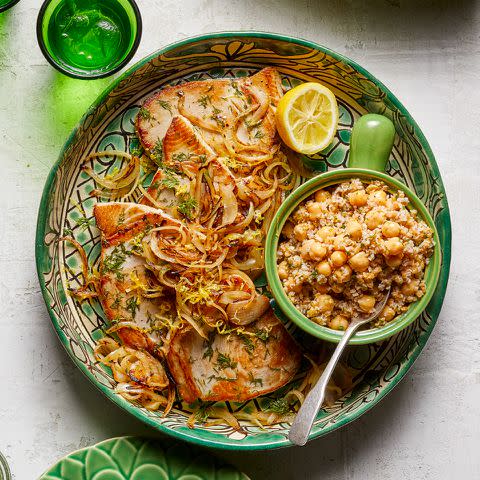
Breakfast (323 Calories)
1 serving Apple-Pie Inspired Overnight Oats
A.M. Snack (196 Calories)
½ cup plain Greek-style strained yogurt
1 medium banana
1 teaspoon sliced almonds
Lunch (373 Calories)
1 serving Slow Cooker Bean, Kale & Barley Soup
1 slice whole-wheat toast
P.M Snack (391 Calories)
⅓ cup hummus
4 carrot sticks
2 oz. whole-wheat crackers
Dinner (574 Calories)
1 serving Seared Tuna with Bulgur & Chickpea Salad
Daily Totals: 1,859 calories, 49g fat, 10g saturated fat, 105g protein, 266g carbohydrate, 40g fiber, 2,244mg sodium
To make it 1,500 calories: Skip the banana at A.M snack and the crackers at P.M. snack.
To make it 2,000 calories: Have 1 medium pear as an evening snack.
Day 6
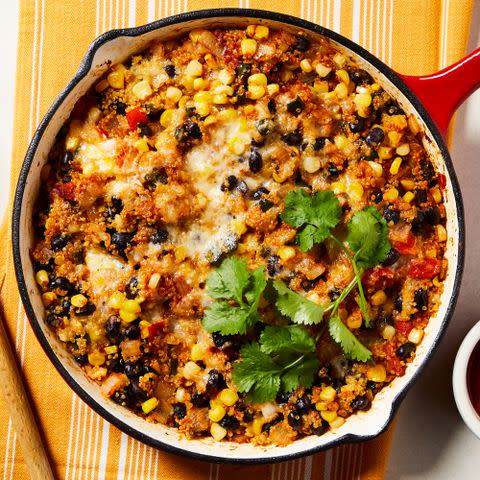
Photographer: Rachel Marek
Breakfast (398 Calories)
1 serving Spinach, Peanut Butter & Banana Smoothie
A.M. Snack (184 Calories)
1 medium pear
½ cup plain Greek-style strained yogurt
Lunch (503 Calories)
1 hard-boiled egg
P.M Snack (292 Calories)
1 serving Everything-Seasoned Almonds
⅓ cup cottage cheese
Dinner (507 Calories)
Daily Totals: 1,860 calories, 67g fat, 15g saturated fat, 109g protein, 218g carbohydrate, 33g fiber, 2,333mg sodium
To make it 1,500 calories: Skip the Everything-Seasoned Almonds at P.M. snack.
To make it 2,000 calories: Add Avocado Toast to breakfast.
Day 7
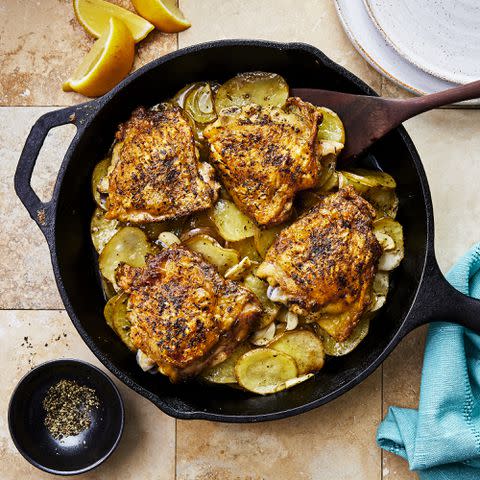
Breakfast (361 Calories)
1 serving Artichoke & Egg Tartine
1 medium orange
A.M. Snack (152 Calories)
1 serving Guacamole with Bell Pepper Dippers
Lunch (436 Calories)
1 serving Kale & Chickpea Grain Bowl
P.M Snack (239 Calories)
1 serving Chocolate-Banana Protein Smoothie
Dinner (433 Calories)
1 serving One-Pan Baked Chicken & Potatoes
1 serving Balsamic-Parmesan Sautéed Spinach
Daily Totals: 1,757 calories, 64g fat, 14g saturated fat, 90g protein, 216g carbohydrate, 48g fiber, 2,297mg sodium
To make it 1,500 calories: Have only ½ serving Artichoke & Egg Tartine at breakfast.
To make it 2,000 calories: Have 1 serving Everything-Seasoned Almonds as an evening snack.
Read the original article on Eating Well.
